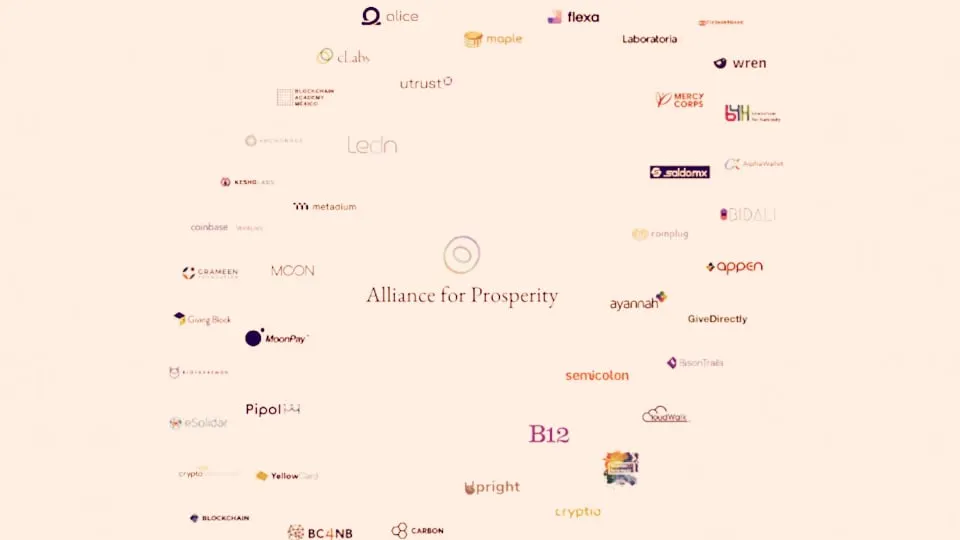In brief
- The Celo Foundation announced the formation of the Alliance for Prosperity
- The alliance includes Grameen Foundation, Andreessen Horowitz, and Coinbase Ventures.
- Members will develop financial tools using the Celo blockchain platform and the Celo Dollar stablecoin.
What's Libra without Facebook? It might just be Celo.
The Celo Foundation, the nonprofit wing of the Celo open-source blockchain project, today unveiled the Alliance for Prosperity, a network of organizations who will leverage blockchain tech—and Celo's stablecoin—to foster global financial inclusion for the billions of people worldwide locked out of banks, credit, and investment vehicles.
More than 50 organizations have signed on as initial members of the A4P, dedicating themselves to building and/or deploying decentralized applications using the Celo blockchain platform developed by cLabs. These applications are custom-built for mobile phones to maximize their reach among the unbanked, refugees, and other neglected populations.
“By design, Celo is mobile-first, and user-first, informed by extensive in-market user research, aimed at serving the needs of communities and enabling use cases,” Chuck Kimble, cLabs’s head of business development and head of the Alliance for Prosperity, told Decrypt. “Alliance members are pursuing a diverse set of use cases, including powering mobile and online work, enabling faster and affordable remittances, reducing the operational complexities of delivering humanitarian aid, facilitating payments, and enabling microlending.”
50 organizations have joined forces to create the Celo Alliance for Prosperity with the vision to enable prosperity for everyone. pic.twitter.com/JWgSI3IDGB
— Celo (@CeloOrg) March 11, 2020
Though the tactics might differ, on a mission-level, Celo doesn't sound terribly different from Libra, which was created to overhaul the current financial system and supplant it with a global currency that allows people to send money cheaper, faster, and safer. The snag in that project is that it was created by Facebook, a technology giant that many view with skepticism.
Celo, on the other hand, is an idealistic startup—one that picked up $30 million in its last seed round from the likes of a16z crypto, Polychain Capital, and LinkedIn cofounder Reid Hoffman. Like Facebook, it's looking to upend the financial system, but it doesn't share the social media company's cultural baggage.
Nor has it signed up Visa and PayPal as partners, although there is some overlap, including Mercy Corps, Andreessen Horowitz, Bison Trails, and Anchorage.
The Alliance for Prosperity includes a mix of blockchain-leaning tech companies like Carbon, mobile wallet providers like Blockchain.com, crypto payment processors such as Coinplug, and investment firms like Polychain.
Katie Haun, general partner at Andreessen Horowitz, told Decrypt, "The power of the Alliance for Prosperity stems from its members. Many of these organizations have on-the-ground operations that will begin to get Celo into the hands of those who have been underserved by the current global financial system.” The glue that might hold the alliance together, then, is its non-profit partners in the international development world, most prominently the Grameen Foundation.
Grameen Foundation, founded in 1997 by Nobel laureate Muhammad Yunus, pioneered the use of microlending for the poor throughout Asia and Africa. Today, it works on money transfers, digital banking, small loans, and digital payments across the supply chain. It reports that it has helped over 11 million people worldwide get access to microloans, savings accounts, and other financial tools.
"We are committed to unlocking financial inclusion barriers to reduce poverty and open economic opportunities for everyone," said Gigi Gatti, Grameen's director of technology for development (T4D). "The Alliance for Prosperity gives us a fresh chance to build, interoperate, secure new financial services applications—it’s about time to cut the cost of bringing financial services to those who need it most.”
Alliance members like Grameen will now start developing actual financial tools for smartphones on the platform.
One possible use case is for payment remittances. In Uganda, for instance, where Grameen and several other Alliance members are active, many people move to the capital of Kampala for work and send money home for school fees and living expenses. That can be done through a service like MoneyGram, though fees cut into the gross total. A popular workaround is a mobile money program offered via a mobile phone carrier.
Users give cash to an agent, usually a store where phone cards are sold, who then loads the customer's phone with credit that they can text to others. The recipient, in turn, cashes out with an agent. Yet these systems still involve middlemen and substantial transaction costs.
Today we’re proud to join 50 incredible orgs in launching the Alliance for Prosperity. Excited to bring open finance & social inclusion to 5.6B smartphone owners around the world on the @CeloOrg platform! https://t.co/5mSmVGEN9P #CeloAlliance
— Grameen Foundation (@GrameenFdn) March 11, 2020
According to Celo founder Rene Reinsberg, that's why this alliance is needed: “The Alliance will use blockchain technology to reimagine the future of money and create inclusive financial tools. From sending money home across borders to donating to a humanitarian organization, we want to make sure that money arrives in the right hands—not in the pockets of a middleman,” he said in a statement.
While members decide for themselves what to work on, the expectation is that they'll use Celo's stablecoin to do it. “By joining the Alliance,” said Kimble, “members are furthering the Celo mission by either: backing development efforts of the project, building infrastructure, implementing desired use cases on the platform, integrating Celo assets in their projects, or collaborating on education campaigns in their communities to further advance the use of blockchain technology.”
And while the Celo mainnet is not yet running, the project is getting closer to having an impact on the global financial system. It rolled out a software development kit for its protocol in August. More recently, it audited validator nodes on its testnet.

